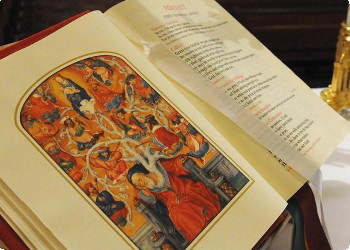Cannot be my disciple
Wis 9,13-19; Ps 89; Fm 9b-10.12-17; Lk 14,25-33
8 SEPTEMBER
To understand what Jesus teaches today about the needs concerning his sequel, we will let ourselves be helped by the discourse of Joshua to the children of Israel after the conquest of the Promised Land. His is a word that never loses its truth and its value.
“Now, therefore, fear the Lord and serve him completely and sincerely. Cast out the gods your fathers served beyond the River and in Egypt, and serve the Lord. If it does not please you to serve the Lord, decide today whom you will serve, the gods your fathers served beyond the River or the gods of the Amorites in whose country you are dwelling. As for me and my household, we will serve the Lord.” But the people answered, “Far be it from us to forsake the Lord for the service of other gods. For it was the Lord, our God, who brought us and our fathers up out of the land of Egypt, out of a state of slavery. He performed those great miracles before our very eyes and protected us along our entire journey and among all the peoples through whom we passed. At our approach the Lord drove out (all the peoples, including) the Amorites who dwelt in the land. Therefore we also will serve the Lord, for he is our God.”
Joshua in turn said to the people, “You may not be able to serve the Lord, for he is a holy God; he is a jealous God who will not forgive your transgressions or your sins. If, after the good he has done for you, you forsake the Lord and serve strange gods, he will do evil to you and destroy you.” But the people answered Joshua, “We will still serve the Lord.” Joshua therefore said to the people, “You are your own witnesses that you have chosen to serve the Lord.” They replied, “We are, indeed!” “Now, therefore, put away the strange gods that are among you and turn your hearts to the Lord, the God of Israel.” Then the people promised Joshua, “We will serve the Lord, our God, and obey his voice.” So Joshua made a covenant with the people that day and made statutes and ordinances for them at Shechem, which he recorded in the book of the law of God. Then he took a large stone and set it up there under the oak that was in the sanctuary of the Lord. And Joshua said to all the people, “This stone shall be our witness, for it has heard all the words which the Lord spoke to us. It shall be a witness against you, should you wish to deny your God.” Then Joshua dismissed the people, each to his own heritage (Josh 24,14-28).
Once the word is given, it obliges forever. God does not give the Word to man for a day. God obliges himself to his Word for eternity. If he gives his word to God, man also must commit himself and be obliged for eternity. The word is not given to God and immediately withdrawn. God gives the Word and creates a new reality in the sacraments. The new reality remains stable for eternity. Even in hell the baptized is a child of God, the confirmed is a witness of Christ, the deacon is a servant of the Gospel, the pastor is a priest and minister of the Word, the bishop is the successor of the apostles. The sacramental consecration is done on the word given by man to God.
Great crowds were travelling with him, and he turned and addressed them, “If any one comes to me without hating his father and mother, wife and children, brothers and sisters, and even his own life, he cannot be my disciple. Whoever does not carry his own cross and come after me cannot be my disciple. Which of you wishing to construct a tower does not first sit down and calculate the cost to see if there is enough for its completion? Otherwise, after laying the foundation and finding himself unable to finish the work the onlookers should laugh at him and say, ‘This one began to build but did not have the resources to finish.’ Or what king marching into battle would not first sit down and decide whether with ten thousand troops he can successfully oppose another king advancing upon him with twenty thousand troops? But if not, while he is still far away, he will send a delegation to ask for peace terms. In the same way, everyone of you who does not renounce all his possessions cannot be my disciple.
The truth that Jesus wants to teach those who want to follow Him is very simple to highlight: once the word has been given, it obliges forever. If he is chosen, he must be chosen forever. There are no timed choices. Sacraments are for eternity. They are a word exchange. Jesus gives his Word for eternity to us, we give him our word for eternity. Always for always, eternity for eternity. If we take back our word, we are unfaithful. He never fails. He is the eternal Faithful.
Mother of God, Angels and Saints arrange that Christians also are eternal faithful like Jesus.





